What are Spanish IR verbs?
Spanish IR verbs are verbs which end in IR in the infinitive form, such as abrir (to open), virir (to live), decidir (to decide) and escribir (to write). This post will cover an extensive list conjugations of regular and irregular Spanish IR verbs in detail with example sentences.
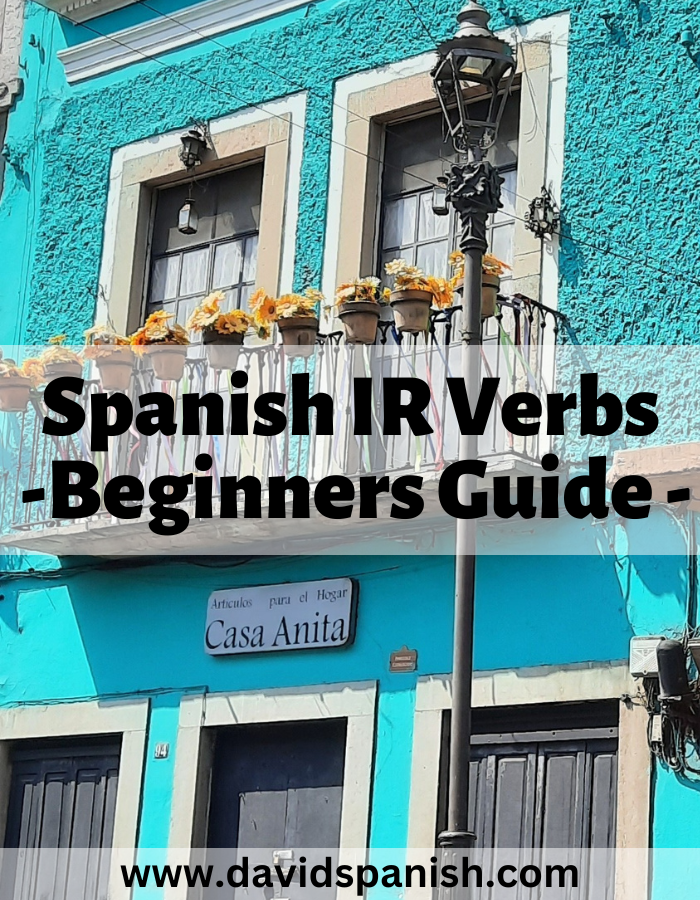
Regular vs irregular Spanish IR verb conjugations
In Spanish, verbs are classified into three groups: AR, IR and RE. These letters are the last two letters of the verbs in their infinitive forms.
Within each group there regular and irregular verbs. If a verb is classified as a “regular IR verb”, then both its stem and endings follow the same conjugation patterns as all other regular IR verbs.
If a verb is classified as an “irregular IR verb”, then either its stem or endings will be different from the regular verbs. The graphic below explains this concept.
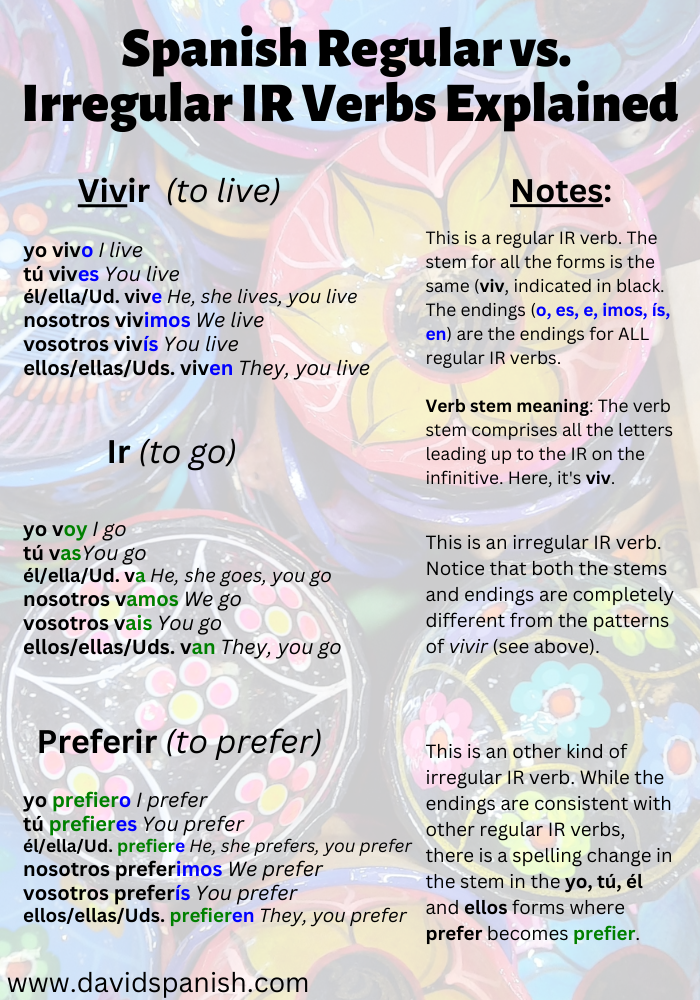
Common Spanish regular IR verb conjugations
The following is a list of common Spanish IR verbs. All of the verbs here follow the same conjugation patterns in their endings and stems.
Vivir to live
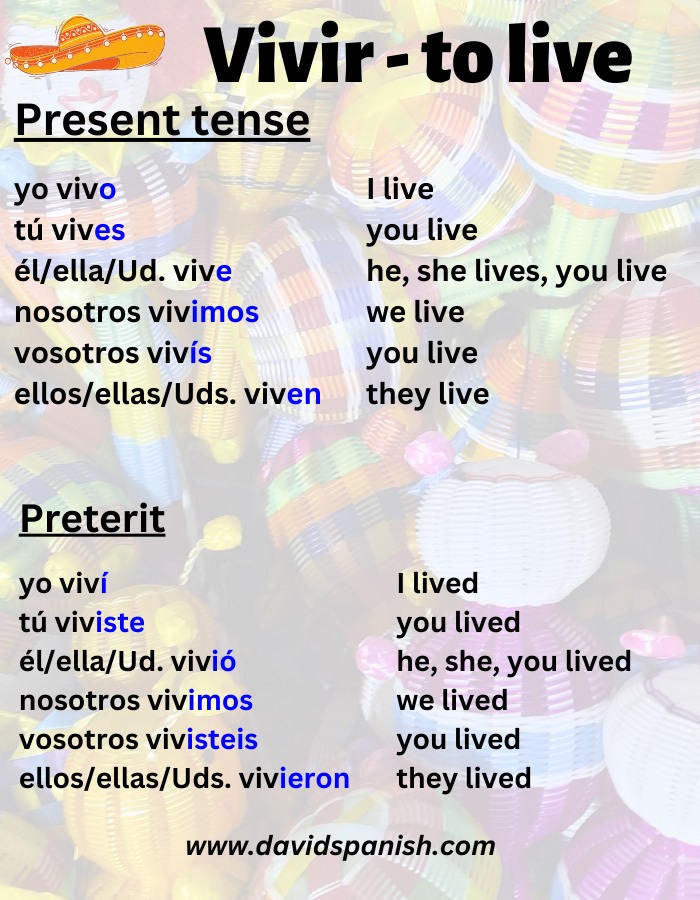
Example sentences:
- Yo vivo en San Miguel de Allende. I live in San Miguel de Allende.
- Ella vive en los Estados Unidos. She lives in the United States.
- Él vivió en Miami. He lived in Miami.
- Ustedes vivieron en Buenos Aires. You lived in Buenos Aires.
Abrir to open
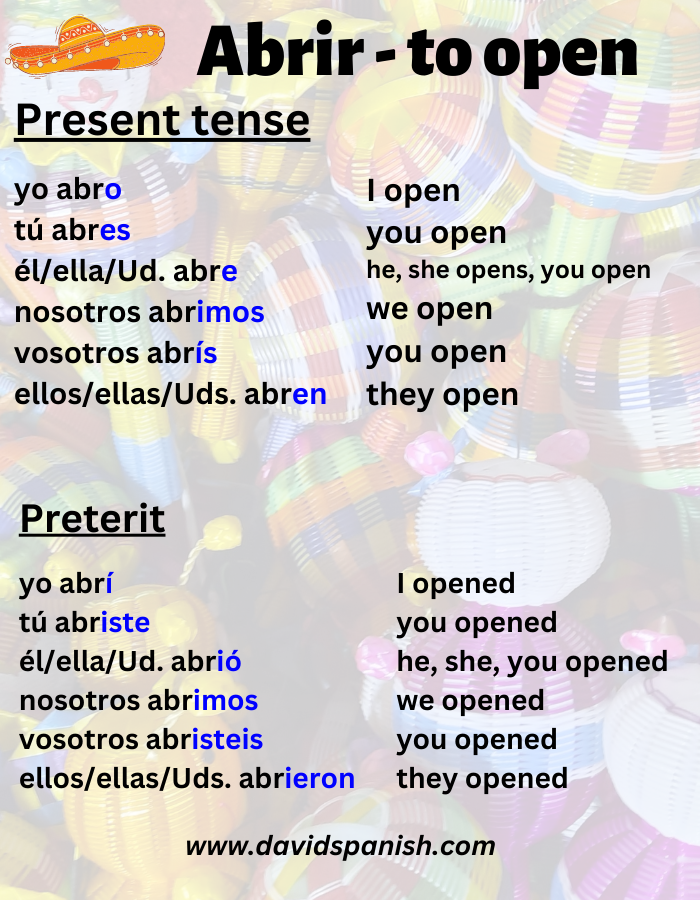
Example sentences:
- Yo abro la porta. I open the door.
- Tu abres la ventana. You open the window
- Usted abrió una botella de vino. You opened a bottle of wine.
- Ellos abrieron la caja. They opened the box.
Decidir to decide
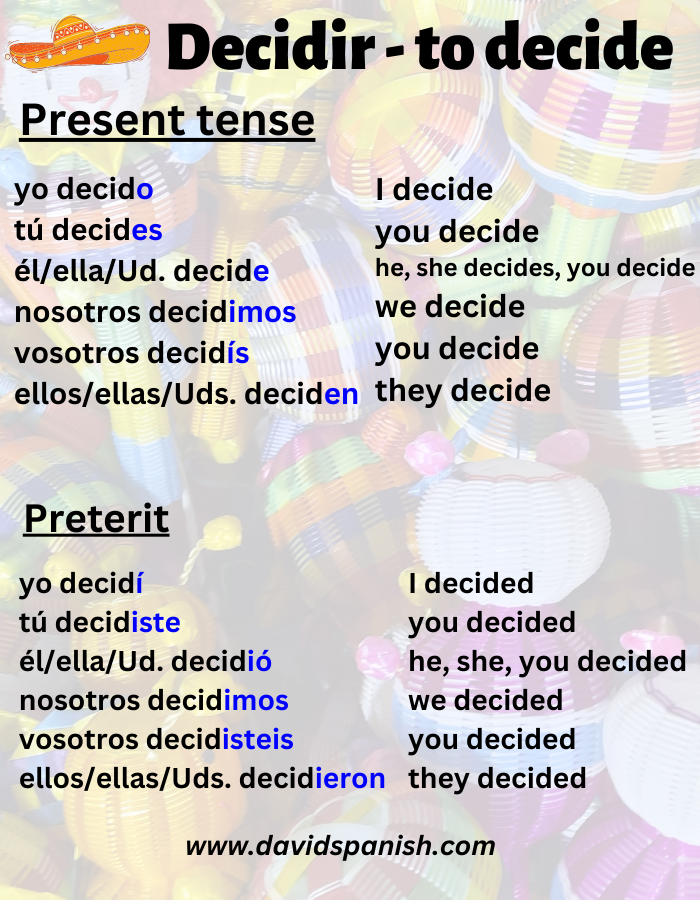
Example sentences:
- Yo decido que hacer. I decide what to do.
- Tu decides vivir en España. You decide to live in Spain.
- Ellos decidieron quedarse en esta ciudad. They decided to stay in this city.
- Usted decidió estudiar en esta escuela. You decided to study in this school
Escribir to write
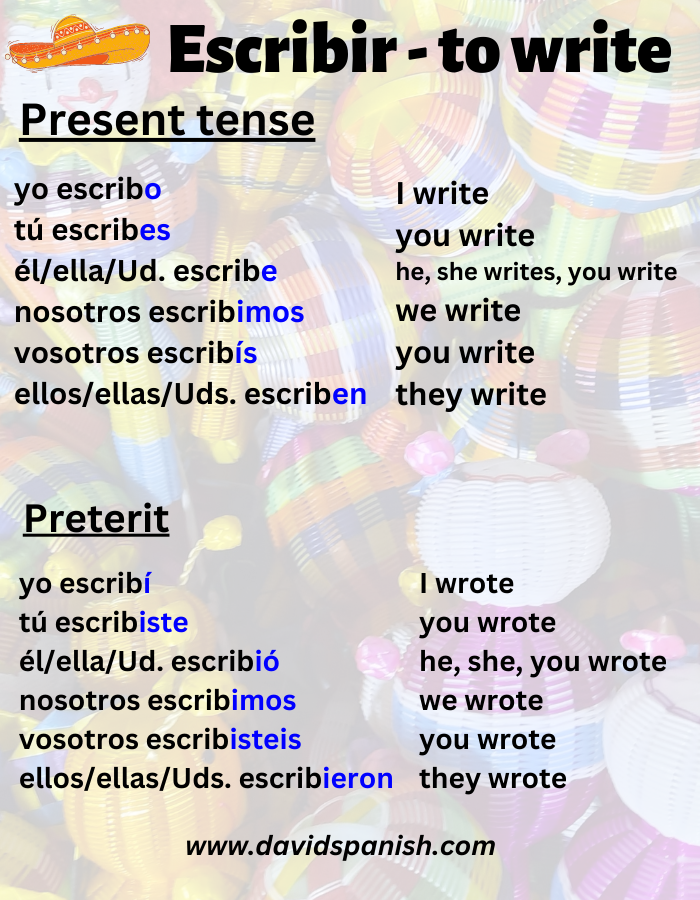
Example sentences:
- Yo escribo la letra. I write the letter.
- Ella escribe su nombre. She writes her name.
- Nosotros escribimos las instrucciones. We wrote the instrucitons.
- Ustedes escribieron la respuestas. You wrote the answers.
Subir to climb, go up
The verb subir has many translations including to climb, to go up, to get on/in (a mode of transportation) and to raise (prices).
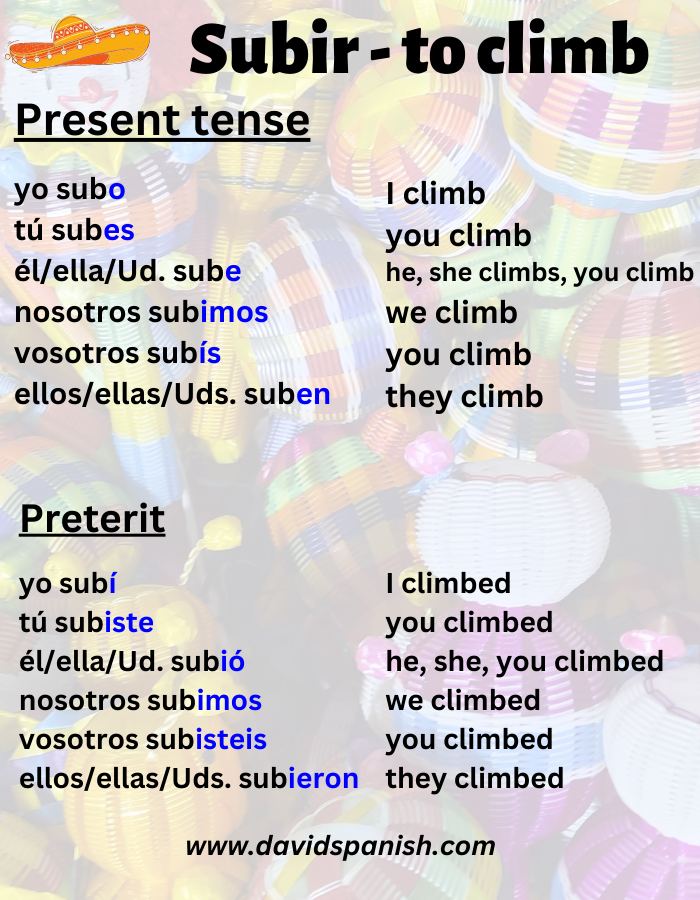
Example sentences:
- Yo subo al coche. I get in the car.
- Tu subes a la montaña. You climb the mountain.
- El gobierno subió los precios. The government raised the prices.
- Ellos subieron por las escaleras. They went up the stairs.
Irregular IR verbs
Many IR verbs become irregular when either the stem, the endings or both change.
Some IR verbs become irregular when the first-person singular (yo) form changes in spelling. The rest of both the present tense and preterit conjugations remain the same as regular IR verbs.
Salir (to leave) is an example. Another translation for Salir is is “to go out”.
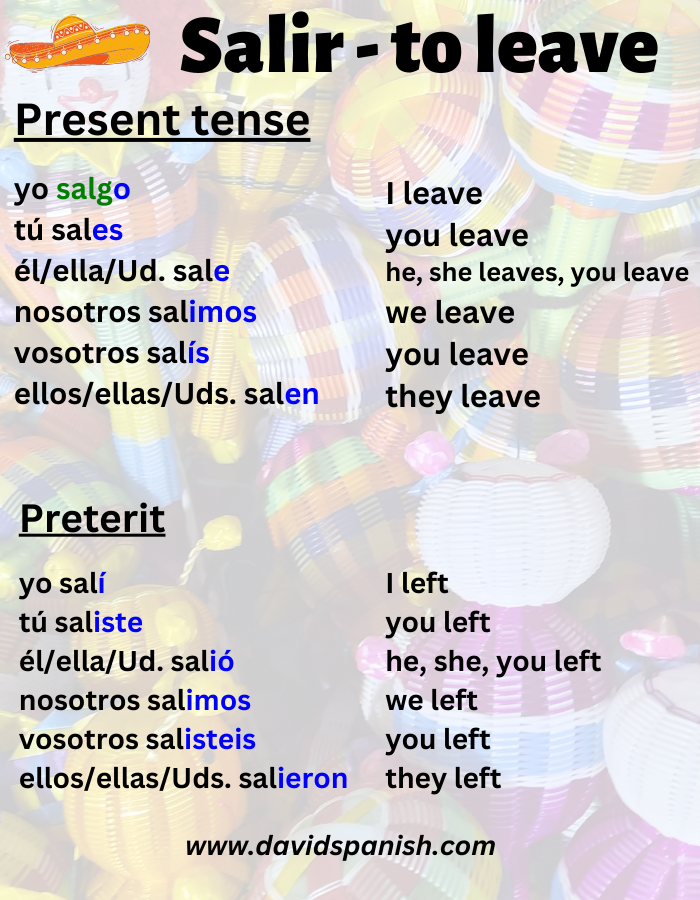
Example sentences:
- Yo salgo con mis amigos. I go out with my friends.
- Tu sales de tu zona de confort. You get out of your comfort zone.
- Usted salió de la casa. You left the house.
- Ellos salieron del país. The left the country.
Traducir to translate
Traducir (to translate) is another verb where the first-person singular (yo) form changes in the present tense.
However, there are more irregularities. The -c becomes a -j in the preterit. Furthermore, there is no -i in the third-person singular (él/ella/Usted) ending. Verbs similar to traducir include conducir (to drive) and producir (to produce).
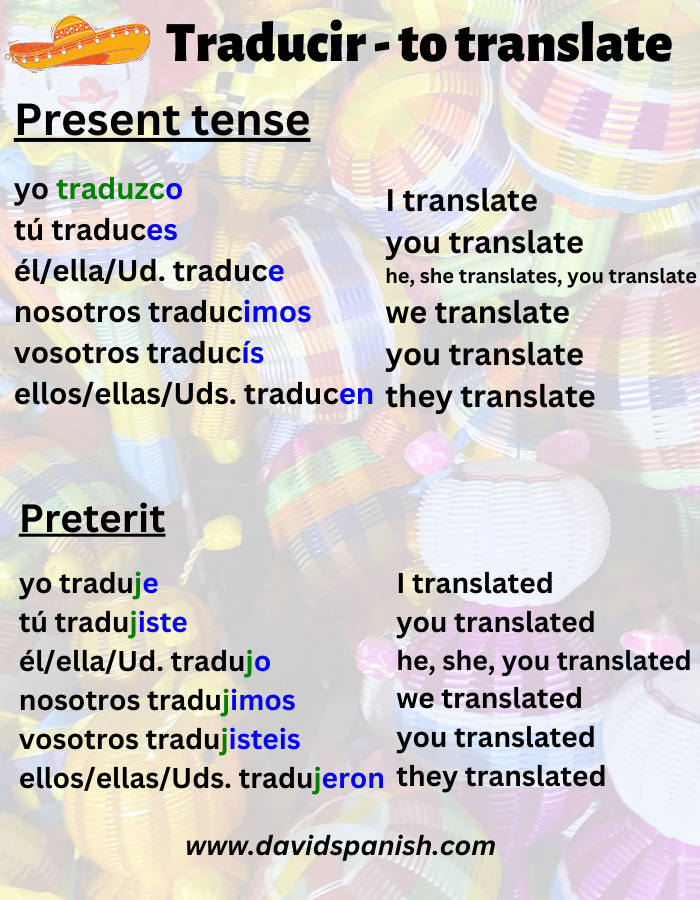
Example sentences:
- Yo traduzco la palabra. I translate the word.
- Ella traduce la frase. She translates the sentence.
- Nosotros tradujimos el documento. We translated the document.
- Ustedes tradujeron la obra. You translated the play.
Exigir to demand
The verb exigir also translates to “to demand”. Other verbs which follow this conjugation pattern include dirigir (to direct), fingir (to prevent).
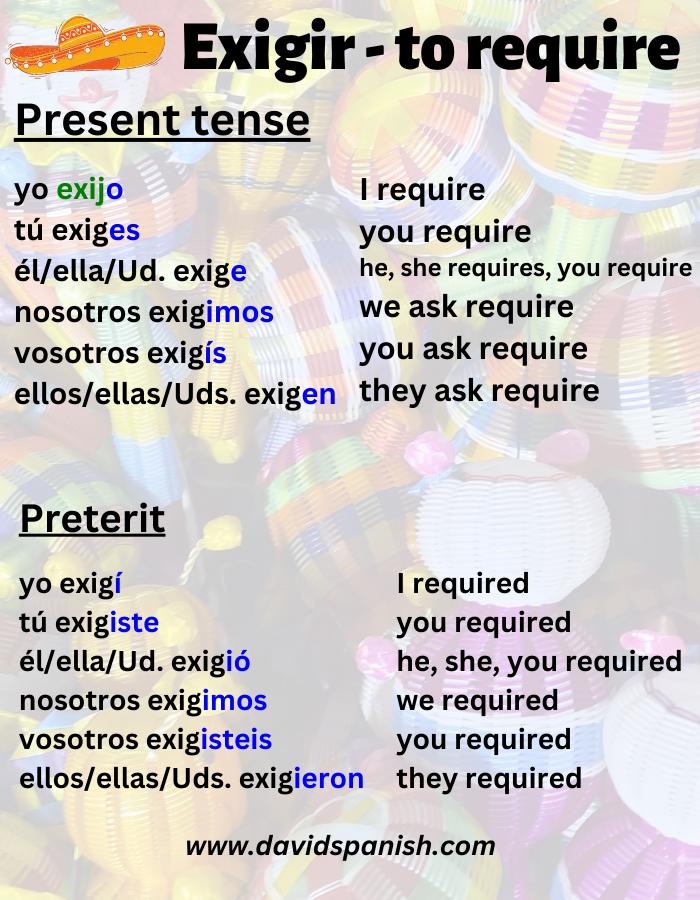
Example sentences:
- El patrón exige mucho de mis empleados. I demand a lot from my employees.
- Este trabajo exige mucho inteligencia. This job requires a lot of intelligence.
Distinguir to distinguish
For this verb, there is a stem change with -gu becoming -g in first-person singular (yo) form. Extinguir (to extinguish) also follows this pattern.
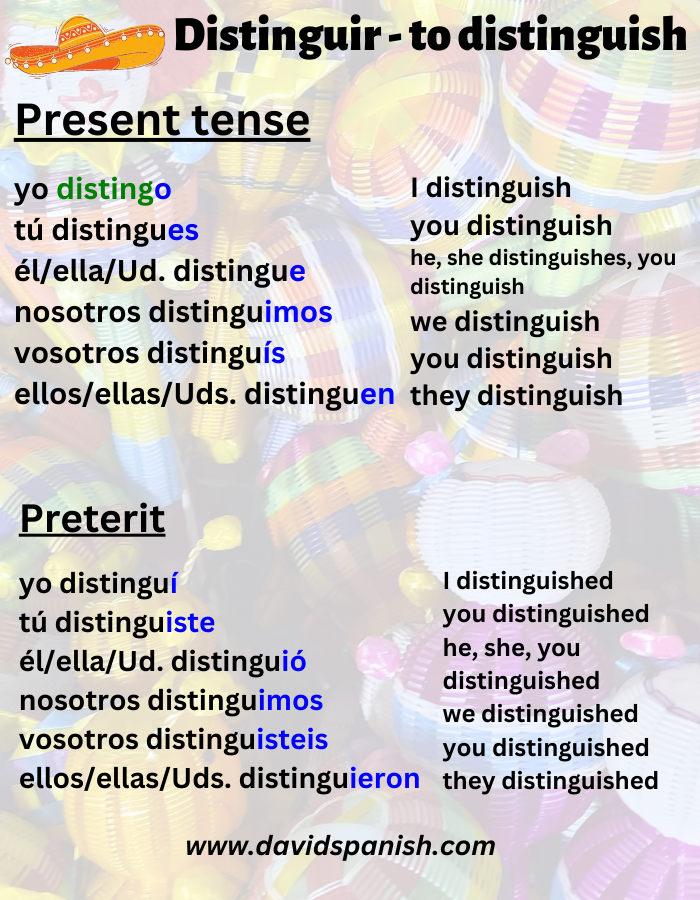
IR verbs with stem changes
Stem change: e -> ie
Preferir to prefer
For the verb preferir, the -e becomes an -ie in the yo, tú, él/ella/Usted and ellos/ellas/Ustedes forms.
Verbs like prefer include advertir (to warn, notify), convertir (to convert), divertir (to have fun), mentir (to lie), sentir (to feel) and presentir (to sense).
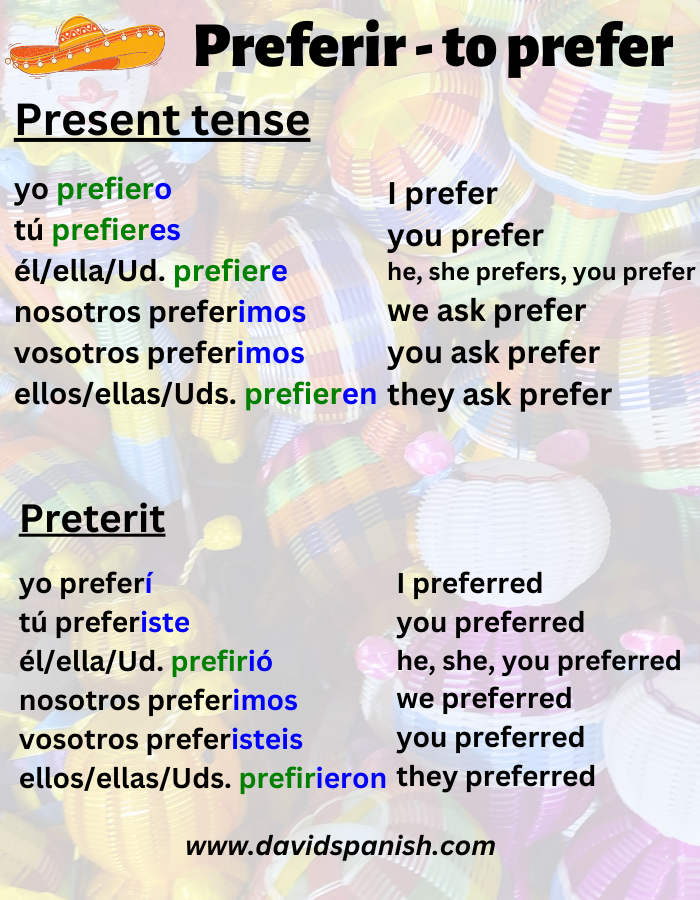
Example sentences:
- Yo prefiero la langosta. I prefer the lobster.
- ¿Qué prefieres, la cocina francésa o italiana? What do you prefer, French or Italian cuisine?
Stem change: o -> ue
Dormir to sleep
For the verb dormir (to sleep), the -o becomes -ue in the yo, tú, él/ella/Usted and ellos/ellas/Ustedes forms. The -o becomes a -ue in both the singular and third-person forms of the preterit. Morir (to die) also follows this pattern.
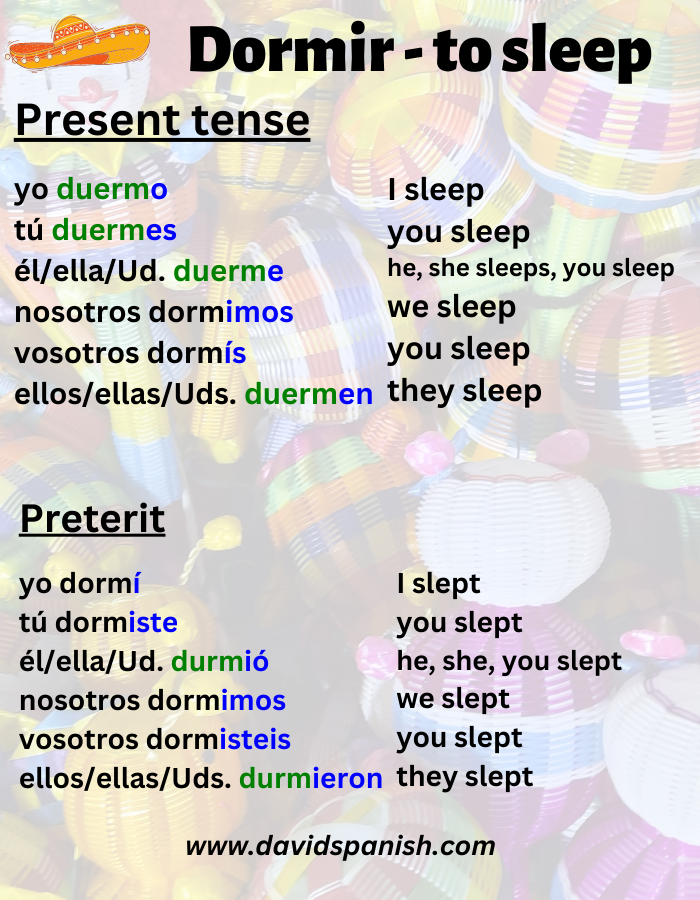
Example sentences:
- Yo duermo en esta cama. I sleep in this bed.
- ¿Comó dormiste? How did you sleep?
Stem change e -> i
Pedir to ask for, to request, order (in restaurant)
For the verb pedir, the -e becomes an -i in the yo, tú, él/ella/Usted and ellos/ellas/Ustedes forms. the -e also becomes an -i in both the third-person singular and plural forms of the preterit.
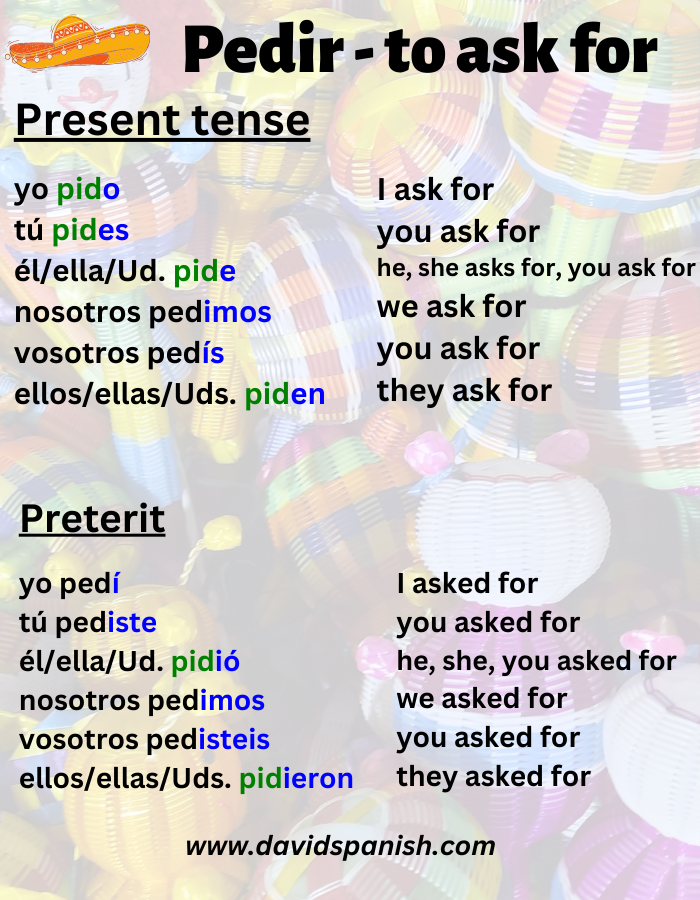
Example sentences:
- ¿Pide usted un café? Are you ordering a coffee?
- Yo pido el bistec. I’m ordering the steak.
Many verbs follow the same pattern as pedir including:
- competir (to compete)
- conseguir (to get, obtain)
- medir (to measure)
- perseguir (to pursue, follow)
- reír (to laugh)
- despetir (to fire)
- elegir (to choose, elect)
- impedir (to prevent)
- repetir (to repeat)
- seguir (to follow)
- servir (to serve)
- sonreír (to smile)
- vestir (to dress)
Other common irregular IR verbs
The following commonly used IR verbs are also irregular. They all have an irregular first-person singular (yo) form. The verb venir (to come) has both an irregular yo form in addition to an e->ie stem change.
Decir to say
Decir (to say, to tell) has both an irregular yo form. In addition the -e in the infinitive becomes an -i in the yo, tú, él/ella/Usted and ellos/ellas/Ustedes forms.
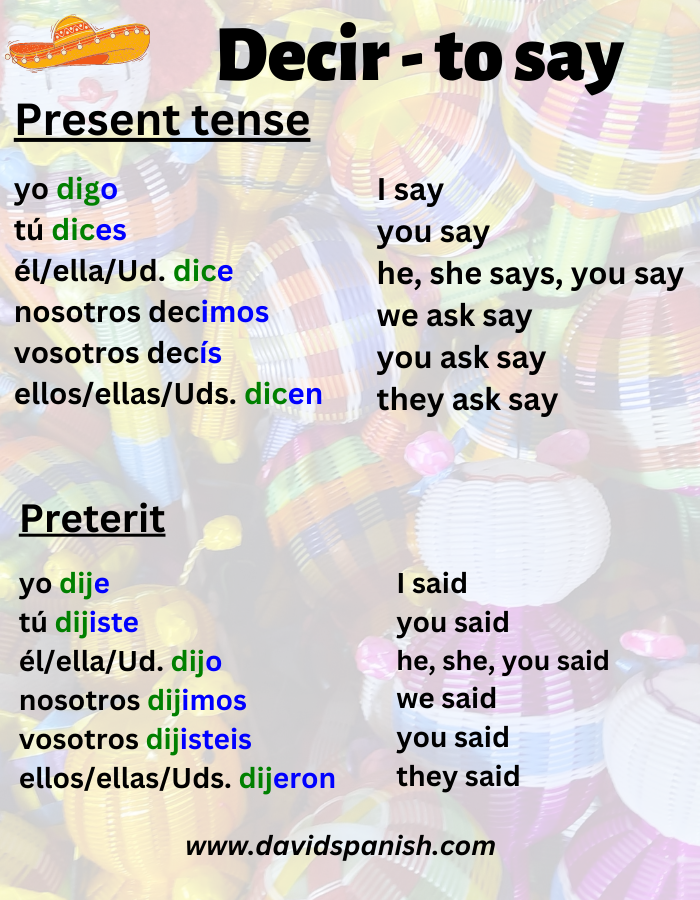
Example sentences:
- Yo digo la verdad. I’m telling the truth.
- Ella dice que no le gusta esta canción. She says she doesn’t like this song.
Oír to hear
The verb oír (to hear) is irregular in that there’s a -g in the yo form. In addition, there is a -y in the tú/él/ella/ellos/ellas forms.
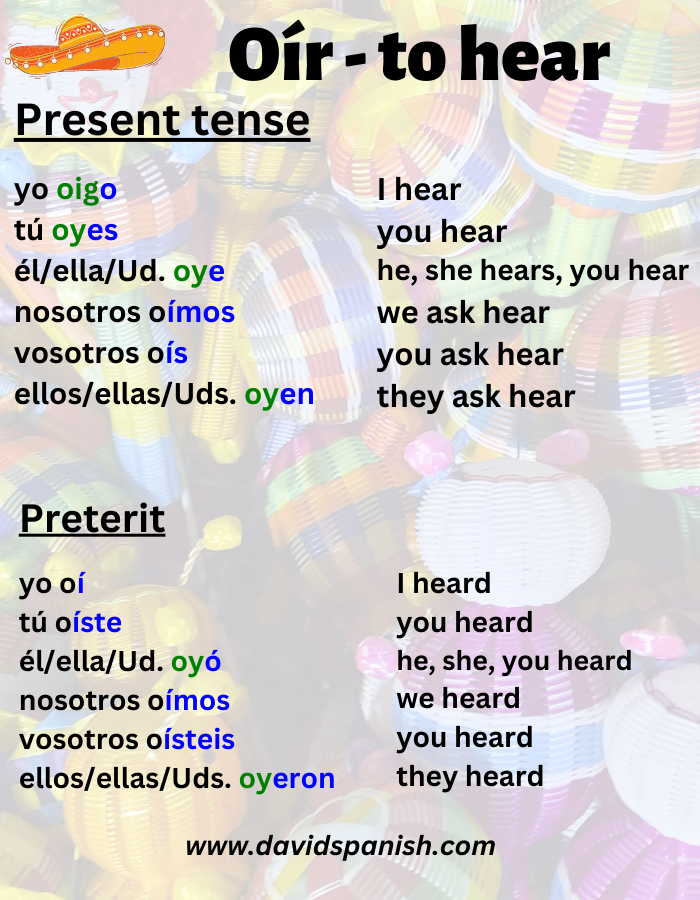
Example sentences:
- Oigo la música. I hear the music.
- Ella oye mi voz. She hears my voice.
Venir to come
Venir (to come) has to irregularities: a -g in the first-person singular (yo) form as well as the -e becoming -ie in the tú/él/ella/ellos/ellas forms.
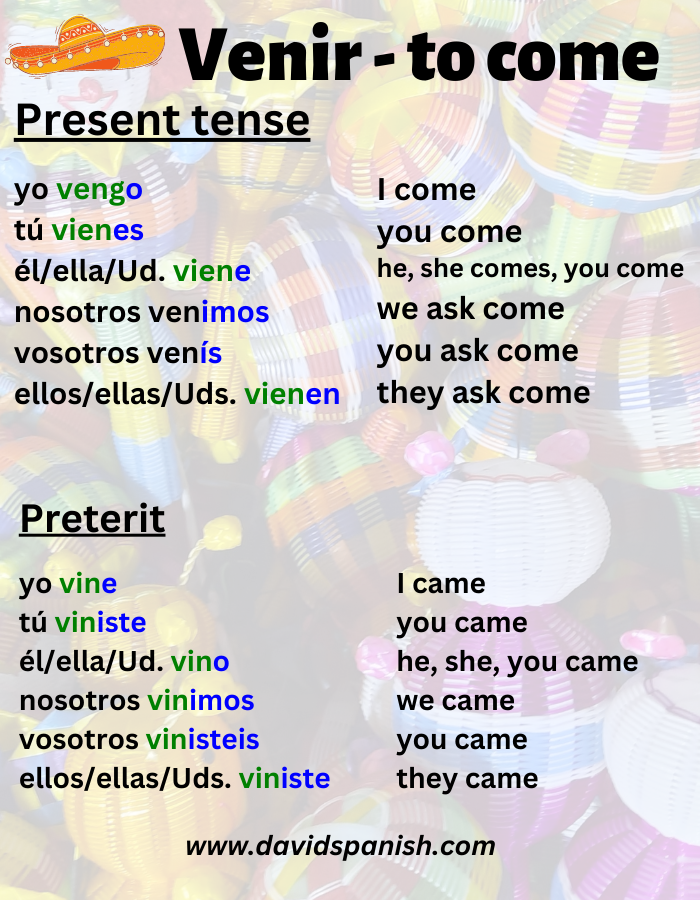
Example sentences:
- ¿De dónde vienes? Where are you from?
- Yo vengo de Cuba. I’m from Cuba.
Discover more:
- La Bamba Meaning, Spanish Lyrics & English Translation - May 4, 2024
- Bésame Mucho Meaning, Spanish Lyrics & English Translation - May 3, 2024
- Querida – Lyrics, Meaning & Translation - May 2, 2024
